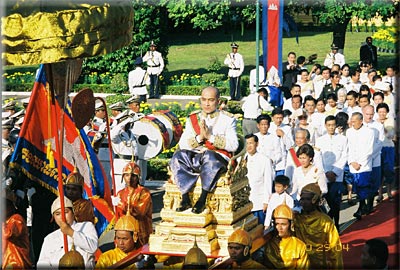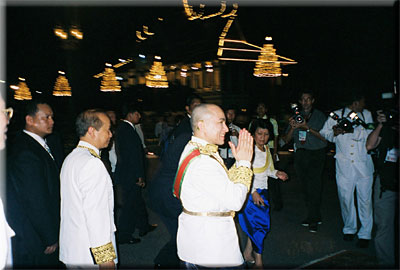The Coronation of a Cambodian King
By Antonio Graceffo
A relentless Cambodian sun played upon the highly-polished bayonets, affixed to the rifles of the military honor guard, standing at rigid attention. Anxiously, they awaited the arrival of Prince Norodom Sihamoni, who would soon be crowned the new king of Cambodia. The droning chant of Buddhist monks could be heard across the palace grounds, as history waited to be made. This would be the first coronation of a new Cambodian king, in more than 60 years, when Prince Norodom Sihamoni’s father, King Norodom Sihanouk ascended to the throne.
Fleets of limousines arrived, bearing the many princes and princesses, representing the two sides of Cambodia’s royal family. The regal guests were followed by the high ranking government ministers, and foreign diplomats.
The coronation of a king is always a special event, one of pageantry and national pride. It was unfortunate, however, that the coronation of King Sihamoni was surrounded by speculation and debate, regarding his father’s abdication. King Norodom Sihanouk, was the first Cambodian king, in recent memory, to quit his post, while still alive. As recently as two days before the coronation, the constitutionality of the King’s abdication was still a subject of debate. A throne council was called, also a first in recent Cambodian history. The council chose Prince Norodom Sihamoni, a 51 year old ballet dancer, who had spent much of his life in Paris, to be the new King. His brother, Prince Norodom Ranarith, would have been the natural successor to their father. But Prince Ranarith, who is head of the FUNCINPEC, royalist political party, had often stated, that he had no desire to assume the position of king.
The appointment of Prince Sihamoni, and the speed with which the throne council operated surprised many Khmers. But most seemed pleased with the decision, echoing sentiments like those of Sok Sop, a long time resident of Phnom Penh. “The old King was very wise.” He said. “He was able to find a solution to the French colonial situation. But the new King is young. And I believe he will bring a new perspective to the Kingdom. I hope that he can find a way to improve the lives of all the people.”
The fact that the new king is unmarried and has no children appears to be a non-issue with the Khmer press, as the crown is not a hereditary monarchy.
Most Khmers said that they loved the King, and seemed to have high hopes for the future. Therefore, it was a shame that the only people permitted to attend the festivities at the palace were a handful of dignitaries and foreign journalists. Citizens were forced to watch the closed affair on television. Even the attendance of opposition leader, Sam Rainsy, was up in the air. Many politicians blamed Sam Rainsy for King Norodom Sihanouk delaying his return to Cambodia, after his latest trip to Beijing. Some went so far as to blame him for the King’s abdication. The King had often threatened to resign his post if the CPP, Cambodia’s ruling political party, and the opposition could not come to an amicable compromise. Most recently, Sam Rainsy had sent a warning letter to the King, explaining that an anti-royalist protest awaited him in Phnom Penh, if he returned from China, as scheduled. The opposition leader claimed that the protests were arranged by the CPP, but were to be blamed on Sam Rainsy. In the end, it is believed that intervention by King Norodom Sihanouk himself secured an invitation for Sam Rainsy. Although the press competed fiercely for photos of the new king, Sam Rainsy was the only coronation guest who was asked to hold an impromptu press conference. It was apparent that journalists wished to ask Sam Rainsy a slue of poignant questions, about his relationship with Prime Minister Hun Sen, as well as rumors that he would be brought in for questioning, regarding his letter to King Norodom Sihanouk. But out of respect for the royal celebration, many questions remained either unasked or unanswered. In an impressive display of linguistics, fielding questions in English, French, and Khmer, Sam Rainsy diplomatically wished the new king well.
“I support the new King.” Said Sam Rainsy. “And I trust that he will use his judgment, and make good decisions. I cannot speak for him.”
The deep base of a tremendous Buddhist drum could be heard, leading a procession of infantry, in traditional Angkor dress. One by one, soldiers, armed with spears and swords, took up their posts, along the path to the palace door. A contingent of bearers marched down the center, carrying ancient artifacts, symbols of the Buddhist faith, and of the divine power of the king. The artifacts were put on display inside of the throne room. As the original Cambodian crown disappeared during the Khmer Rouge regime, a copy was made for this occasion. But the crown was for display only. The king would not be wearing it.
Once the final preparations were completed, a gold colored litter arrived, borne by strong soldiers in ceremonial Khmer costume. The passenger, mounted on a beautiful and ornate seat, high above the heads of onlookers was his majesty Prince Norodom Sihamoni. The litter was lowered to the ground, and the prince was escorted into the great hall. The doors were closed, but the chants of Buddhist prayers could be heard through the walls of the regal building.
Mere hours had passed. But when the doors reopened, and King Norodom Sihamoni immerged, Cambodia had a new King. And hopes were high that a new age of Cambodian prosperity had begun.
Copyright © Antonio Graceffo 2004